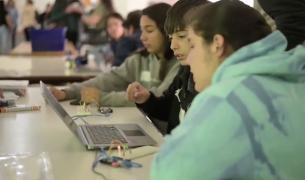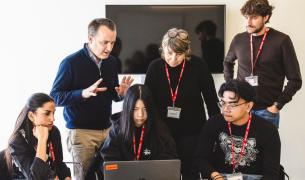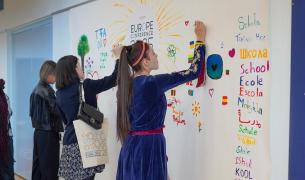Seven Reasons for Hope in MENA

Read this piece in Arabic.
Open any newspaper to the international section on any given day, and it's hard not to feel gloom and doom, especially when reading about the Middle East and North Africa. Yet while we can’t ignore the challenges in the region, we should also recognize the work being done by determined local leaders to address the difficulties we read about. Rather than just expose problems, we need to shine a light on the people creating positive change, and who are pointing us in the direction we need to go.
While many talented young people feel compelled to leave and pursue opportunities elsewhere, more and more are choosing to stay and confront the problems they know from firsthand experience. As the regional head of Teach For All for MENA, I’ve gotten to know a multitude of local social entrepreneurs bringing new ideas and initiatives to this diverse and complex region. The challenges they face are multiple, but so are the seeds of positive change they are planting, and I see reasons to be energized by the many transformative shifts underway. I joined Teach For All, a global network of independent organizations in 59 countries working to develop collective leadership to ensure all children fulfill their potential, in 2010 and now lead its network growth and partner engagement efforts across a region that stretches from Morocco to Pakistan. Each network partner recruits and develops promising diverse young graduates and professionals who commit at least two years to teach in under-resourced classrooms and, with this foundation, work throughout their lives from inside and outside of education to address systemic issues facing children.
For the International Day of Education, and as we enter another year of uncertainty due to COVID-19 and issues related to the pandemic, I'd like to celebrate some of the often unheralded efforts that are driving possibilities for development and transformation in this region.
A rising generation of changemakers
A new generation of young leaders is choosing to stay in the region, create local solutions, and equip people to meet urgent and varied needs. We’ve seen over and over that sustainable development comes from steady work at the local level—particularly work done by those who have themselves experienced the problems they seek to solve. Change may be slow, but it is possible. Teach For All partners in Lebanon, Morocco, Pakistan, and Qatar are patiently applying a people-first approach, cultivating the agency and skills of local people—recent college graduates and young professionals, students, students’ families, other teachers and community members. Facing systemic problems, and with issues exacerbated by the COVID-19 crisis, they are developing innovations and the capacity to continuously improve over time rather than relying on top-down or imported solutions.
Cultivating leadership locally
We’re also seeing that leadership can be developed, and that a leadership mindset supports people to believe in and enable positive change, even in complex circumstances. There are many ways leadership can be practiced, and our network partners are helping pave the way. For them, it’s by committing to teaching in underserved schools, planting the seeds of leadership in students while themselves developing the skills to exert lifelong leadership, and often staying for their whole careers in the education sector to work at every level of school systems, policy, and across sectors to effect systemic changes.
There is massive untapped talent in the region, and cultivating local leadership is a critical path to change and sustainable progress. Long-term investment in this leadership is particularly important in this region where the youth unemployment rates are the highest in the world, and education systems are failing to prepare young people for the world of work.
Keeping kids learning
During pandemic school shutdowns, Teach For All partners worked on the forefront of keeping kids learning in low- and no-bandwidth communities. In Pakistan, Teach For Pakistan teachers knew that maintaining contact with their students was critical. They helped figure out which students had digital access, and how to reach those who didn’t; tailored lessons to issues raised by the pandemic; and developed curriculum that used low-bandwidth technology like WhatsApp and SMS—as well as printed learning packets distributed by local families, mosques, and shopkeepers. As they grappled with the impacts of school closures, network partners responded with creative and innovative solutions to continue reaching students to ensure they stayed safe and healthy, and continued learning.
Women rising
There is an ever growing cohort of female social entrepreneurs in the MENA region. The region has more emerging social entrepreneurs than commercial ones, filling gaps in public services, addressing community challenges, and promoting goods and services to marginalized populations. Across the region, 70% of Teach For All network partner teachers are women. As alumni, they are becoming the veteran educators, social entrepreneurs, and policy leaders who are pushing for new ways of addressing the myriad of challenges facing the region’s most vulnerable children. The new generation wants to see change and is finding ways to challenge and bypass traditional paradigms.
Overcoming structural obstacles
The MENA region is a challenging environment. Legal and government frameworks are complex to navigate, and education itself can often be a charged subject. Nonetheless, our network is making an impact in places where it’s hard to set up an organization, let alone sustain it. Social entrepreneurs are patient, they understand and can navigate complexity because they live and work here—and are not going anywhere.
No matter how tough the context, there are incredible people who want to make things happen. For example, COVID-19’s effect on Lebanon was exacerbated by other crises: the currency collapse, the August port explosion, and ongoing political unrest. Nonetheless, Teach For Lebanon managed to shift most of their programs to virtual spaces; renewed partnerships with top universities to provide support networks to alumni; formed a partnership with the Mine Centre at the Lebanese University; launched The Build Back Better Initiative to support students and school communities affected by the economic crisis and the Beirut blast; and partnered with a local health institute to offer free mental health support for parents, teachers, and students affected by the blast.
A new focus on early childhood education
Historically there has been under-investment in early childhood education, but we see this starting to change. A shift to emphasizing its importance is a growing trend in the region - throughout MENA, we see network organizations and entrepreneurs developing projects in the early childhood education sector. Early childhood education is now mandatory at age four in Morocco, and Teach For Morocco has received national and local government support to work in public early grade classrooms, along with seeing prospects to scale across the country.
Teach For Morocco had been in full operation for only about a year when COVID struck. During school shutdowns, they realized that reaching their youngest learners at home required working closely with their families, which often meant overcoming technical and cultural issues. They launched a "Web TV" initiative to make their teachers’ content easily accessible and fun to engage in. Teachers, schools, and communities that had not been associated with Teach For Morocco started learning through these videos, demonstrating how the work of innovative leaders has a ripple effect throughout communities.
Teaching life skills, and trauma-informed education
There is a growing effort to provide children with psycho-social support and life skills, along with teaching traditional academic subjects. During COVID shutdowns, Teach For Pakistan teachers addressed the emotional strains on their students—particularly girls—by creating learning routines, exercises, and games to connect them to their friends, help them process anxieties, and keep them committed to their learning and life goals.
In addition, teachers are integrating trauma-informed practices into their work. While all children have been affected by COVID, the impact on millions of school-aged refugee children of different nationalities residing in 20 countries within the MENA region is particularly devastating. In Beirut, the explosion in the port intensified an already difficult situation, and social entrepreneurs across the city have been active in trauma-informed work to keep vulnerable refugee populations in school. Even where it seems impossible, in fragile conflict and post-conflict zones, there are young people ready to step up and lead.
Our challenge is not just to recover from the pandemic and the global recession, but to address the serious inequities they have laid bare. To do so, we must invest in people before projects—people who will stay and fight, patiently, for change on the ground. Solving social issues that appear intractable demands leadership, resilience, relationship-building, vision, and hope. The MENA region needs support for more locally-based leaders and innovators who are willing to combine the urgency and creativity necessary for innovation with the patience and relationships necessary for success.
I’m proud to be part of a network helping to support innovative organizations, communities, families, and entrepreneurs who are cultivating the hope and change needed to build a better and more just world—in this region and beyond.


